Prologue: The Whistle-Stop Curse
“But that train keeps a movin’, and that’s what tortures me.”
— Johnny Cash, “Folsom Prison Blues”
Trains have a time-honored and deeply ambivalent place in American politics.
Harry Truman promised to “Give ‘em hell” from the platform of a train, and an instant legend was born.
On the other hand, Hunter Thompson was so maddened by the “insane, rat-bastard tedium” of Ed Muskie’s “Sunshine Special” during the 1972 primaries that he passed his credentials to a gin-crazed ex-con who terrorized the club car and then tried to fondle a gaggle of young college volunteers, all decked out in mini-skirts and white straw “Trust Muskie” hats. Panic ensued.
 You see VDB’s point.
You see VDB’s point.
Political trains travel always on the razor’s edge of publicity, and finally fall one of only two ways: the Express to Victory, or the Train in Vain.
Trains are massive, rolling political symbols, and in case you forget that, they come to a crossroads every fifteen minutes and remind you with an ear-splitting whistle.
Clinton’s use of the train during the 1996 Democratic convention was the form at its modern apex. Clinton’s handlers knew that reporters would be desperate for stories on the convention floor — and they also knew that no stories would be available, given the pre-packaged nature of the gathering. Which would drive reporters to sniff out negative stories to fill the void.
So Harold Ickes put Clinton on a gleaming silver, 4,000-horsepower, hi-tech, double-decker marvel that meandered to Chicago over the course of nearly a week, and Clinton’s larger whistle stops were beamed directly to the convention.
For a campaign simply trying to run out the clock on the hapless Dole operation, it was a master-stroke: the top story of the convention involved the means Clinton used to get there (though Dick Morris’s “shrimping” fetish would eventually run a close second).
In Show Time, Roger Simon’s brilliantly funny memoir of the ’96 campaign, Simon notes that Ickes and Mike McCurry left the sound system on long after each whistle stop was finished for the night.
Why? Because they knew their candidate couldn’t resist returning to the microphone as the evening deepened and the train rolled along, couldn’t resist greeting small knots of people gathered along the tracks, in order to squeeze one more vote out of the day.
More than anything, Clinton apparently just called out random compliments into the dusk: “Nice bikes!” to some boys popping wheelies near the tracks, and “I like your doggie!” to an elderly woman walking a retriever.
The train provided the perfect technology for a restless candidate driven to meet and charm every last American.
But not every campaign masters the art. In fact, precisely half don’t, and their trains are remembered forever after as — well, wicked bad trains.
So when word leaked that the Welch campaign was officially kicking off with a one-day whistle-stop tour of the state, VDB held its breath. The Welch campaign has had an excellent run thus far, and packing the entire operation and a handful of serious VIPs onto a train to Rutland seemed a lot like letting your brand-new stack of chips ride on the roulette wheel at Monte Carlo.
But of course, if you don’t bet, you can’t win.
And with 70% of Americans telling pollsters that the country is headed down the wrong track, who could resist the distant whistle of the Big Symbol?
The Kick-Off: Sharp Cheese, Big Firefighters, and a Barn Unexpectedly Burned
We got there early but the crowd was already thick.
The rain — which had been falling for three straight weeks — held off, which looked good, but still the sky was overcast, which looked iffy, with the occasional rain cloud threatening off to the south. The crowd was good-sized, somewhere between 100 and 200, and the food was plentiful.
Still, while there were excellent chocolate glazed donuts, there was no coffee anywhere in sight, and we still couldn’t shake the acid-stomach feeling that everything was balancing on a knife’s edge.
The mood was undeniably up-beat: nothing like hanging around on a train platform to make people feel crazy and footloose. Burly guys wearing orange “Firefighters for Welch” t-shirts and big smiles. Television cameras, print guys, activists, volunteers, parents with kids who maybe just ambled over to see a train roll out. Pat Leahy, Madeleine Kunin, Peter Clavelle, Phil Hoff, John Tracy, all in the mix, slapping shoulders.
Even the ever-elusive Adam Quinn, there one minute, gone the next, like the Shadow.
So by the time the speeches started — all delivered Truman-style from the rear platform of the train car — we were optimistic. It looked like the Welch “Back on Track” Express would avoid the curse of Sam Yorty and Ed Muskie and all the others who ultimately found the whistle-stop format impossible to master.
And then Mary Kehoe, Welch’s step-daughter, stepped up to the microphone and began to introduce Pat Leahy — and nothing happened. No amplification, at least.
People in the audience shouted advice, but nothing helped. The mike was dead.
But Mary isn’t the offspring of a political family for nothing. She batted the useless mike aside and bent to her task, introducing Welch as a man not only of the Legislature, but of the kitchen, a man who knows how to stuff a chicken and “where to find Uncle Ben’s Long Grain Wild Rice in the grocery store.”
It was a nice glimpse into Welch’s domestic side. Mary toughed it out, that is, but the hassle with the mike had thrown her good speech slightly off track, and her voice was finally a bit too quiet to fully compensate.
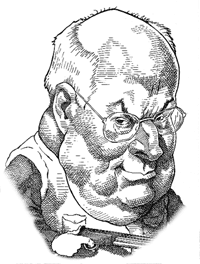 Then Pat Leahy stepped to the microphone, and he too ignored it and spoke directly to the crowd. Leahy has been the tireless cage fighter of the Democratic Party these last 5 years, battling on long after Democrats had been routed most everywhere else. Again and again and again, Leahy has championed the ideals closest to the Party’s heart. Against the worst the GOP has to offer: Bush, Cheney, Rumsfeld, Rove.
Then Pat Leahy stepped to the microphone, and he too ignored it and spoke directly to the crowd. Leahy has been the tireless cage fighter of the Democratic Party these last 5 years, battling on long after Democrats had been routed most everywhere else. Again and again and again, Leahy has championed the ideals closest to the Party’s heart. Against the worst the GOP has to offer: Bush, Cheney, Rumsfeld, Rove.
In fact, the second post VDB ever ran was called “The Shadow Administration,” and it argued that Leahy, and Jim Jeffords, and Howard Dean — and the Vermont Supreme Court — have between them come to represent an anti-Bush, shadow administration, while Vermont itself has become the winter quarters for core American values stemming from the Bill of Rights.
Leahy, in other words, needed no microphone.
He called the current administration and the Congress “a culture of contempt,” and Martha Rainville a “rubber stamp for the GOP.” Leahy came through loud and clear, which everyone gathered there would have predicted.
But then something unpredictable happened: Leahy introduced Peter Welch, and Welch thanked Leahy, and the other VIPs, and the firefighters, and the staff — and then he reared back on his heels and delivered the best, the most powerful, the most eloquent speech delivered by anyone in this cycle thus far, bar none.
It went well beyond Leahy’s speech, hard-hitting as it was, to denounce the current administration and to declare that there were two options: to hide our heads under the covers while Washington dismantles America, or to fight.
“I choose to fight!” Welch shouted, and his voice carried real authority. He summed up the Bush Administration’s approach in five words: “You are on your own.” If you want healthcare, Welch called out, you are on your own. Clean air, you are on your own. It became a call and response, with Welch continuing the litany of ways in which Americans have been failed by conservatives in Congress, and the crowd calling back, “You are on your own.”
We’ve seen Welch speak several times before, and we saw him deliver an excellent speech at the Barack Obama event at UVM earlier this year. But this speech broke new ground.
This was a fiery speech, liberally peppered with the word “fight,” what they used to call a barn-burner in the old days.
Maybe it’s because Welch has been watching old Bernie Sanders video; maybe it’s because the Republicans in Congress represent some of the fattest targets in modern memory.
Whatever the reason, it was the speech of the campaign.
And at the height of it, when the crowd was up on its toes, Welch shifted gears in the way that the best speakers do, downshifting for emphasis, promising to protect “the last, the least, and the lost among us.” The crowd began to chant: “Back on track, back on track!”
And then — in the small clean pause after the chanting stopped and Welch had said his goodbyes — the train whistle called.
It was the sort of moment spin-doctors labor over for weeks, but in this case, it just happened. And it reminded you why politicians for more than a century have sought to harness the train to the campaign.
Because when it works, it’s pure magic. And that kind of magic cannot be bought.
Epilogue: In Which VDB Eats More Donuts
VDB rode to Shelburne, and they served more cheese and strawberries and donuts. And it was a genuine pleasure, to ride the rails even for twenty minutes, rocking along through the South End of Burlington, ten feet from Lake Champlain, “slow-balling” as Johnny Cash used to like to say.
The train was full of friendly, optimistic people. The men operating the train wore glossy black old-school hats, with gold braid and the word “Trainman” lettered across the front. Great stuff.
But nothing could match the high point of Welch’s kickoff speech itself. You had the sense from the speech that nothing is going to stop Peter Welch at this point: not a dead microphone, not Martha Rainville, not a Republican Congress working in concert with a corrupt administration.
You had the sense of momentum, of a campaign that has found its message, its language, its deep purpose.
The sense of a train just now beginning to highball, to use the technical term.
 All political dialects will be spoken, it should go without saying. Contrary to some reports, this is bigger than bloggers and blog readers alone — we’d love to have anyone with even a passing interest in the races and issues of the day grab a bun and get happy.
All political dialects will be spoken, it should go without saying. Contrary to some reports, this is bigger than bloggers and blog readers alone — we’d love to have anyone with even a passing interest in the races and issues of the day grab a bun and get happy.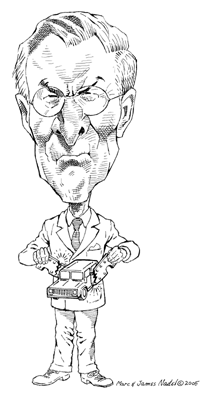 And although Tony Snow will eventually insist that it was prepared by an intern with no real authority, the document is signed by the US Ambassador to Iraq, Zalmay Khalilzad.
And although Tony Snow will eventually insist that it was prepared by an intern with no real authority, the document is signed by the US Ambassador to Iraq, Zalmay Khalilzad.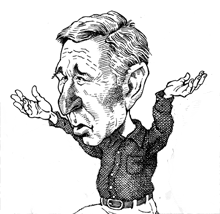 Well, the
Well, the 

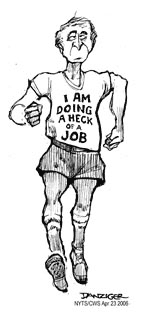 I used to believe that Bush and Cheney and Rumsfeld were livid that their extra-legal bolt-hole had been exposed to minimal public scrutiny. I used to believe that they were frantic about the disclosure of their bizarre and whimsically cruel tactics.
I used to believe that Bush and Cheney and Rumsfeld were livid that their extra-legal bolt-hole had been exposed to minimal public scrutiny. I used to believe that they were frantic about the disclosure of their bizarre and whimsically cruel tactics.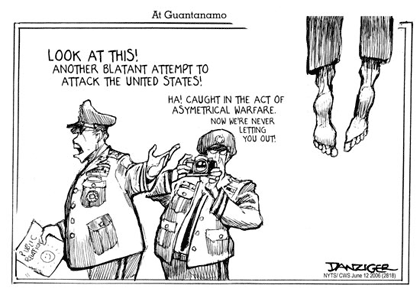
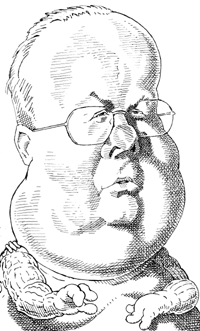
 Then Pat Leahy stepped to the microphone, and he too ignored it and spoke directly to the crowd. Leahy has been the tireless cage fighter of the Democratic Party these last 5 years, battling on long after Democrats had been routed most everywhere else. Again and again and again, Leahy has championed the ideals closest to the Party’s heart. Against the worst the GOP has to offer: Bush, Cheney, Rumsfeld, Rove.
Then Pat Leahy stepped to the microphone, and he too ignored it and spoke directly to the crowd. Leahy has been the tireless cage fighter of the Democratic Party these last 5 years, battling on long after Democrats had been routed most everywhere else. Again and again and again, Leahy has championed the ideals closest to the Party’s heart. Against the worst the GOP has to offer: Bush, Cheney, Rumsfeld, Rove.